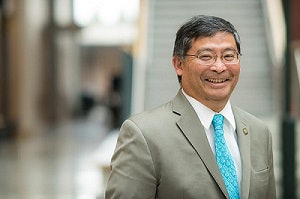As the coronavirus pandemic continues and unemployment rises, postsecondary classrooms swell with returning students seeking new job skills, including through non-degree credentials. But how can colleges ensure that these programs actually lead to future educational opportunities and viable careers for diverse students in a time of uncertainty?
On Tuesday, an online panel delved into these questions with a focus on building career pathways with stackable non-degree credentials. It was the final discussion in a series hosted by the National Skills Coalition, an education reform nonprofit, and Education Strategy Group, an education consulting firm.
 Dr. Mark Mitsui
Dr. Mark Mitsui“With the pandemic, we really have seen a tremendous amount of folks filing for unemployment, looking to be reskilled and really trying to figure out what’s next,” said Brett Visger, the director of Education Strategy Group. “People have signaled there’s tremendous interest in returning to school to gain skills.”
Panelists emphasized that non-degree programs can offer quicker routes to jobs than degree programs for non-traditional students who need to juggle other priorities while in school. The benefit of “stackability,” or programs that students can easily return to for more advanced credentials, is the flexibility it affords.
“Up until the pandemic at least, almost all of our students were working while going to school, taking care of families, putting food on the table, keeping a roof over their heads while they’re going school … ” said Dr. Mark Mitsui, president of Portland Community College. “We had students who needed an educational pathway that led to a great career, would fit their very hectic lives, allowed them to come in and out of college as they moved up, provided wraparound supports as well as cutting-edge training through industry partnerships and connections.”
But there’s work to be done to make sure these programs have equitable outcomes, especially amid a pandemic.
Mitsui pointed out that Black, Latinx and indigenous workers are the most likely to experience income loss during the pandemic, and people with a high school degree or lower make up 56% of unemployment claims, while only comprising about 28% of the workforce.
As national income inequality rises, he sees a “tale of two cities” in Portland, Oregon, against the backdrop of a “tale of two countries,” reflected in postsecondary education completion rates.
 Dr. Girard Melancon
Dr. Girard MelanconA study in Ohio – conducted by Dr. Lindsay Daugherty, policy researcher at RAND Corporation – found that while underrepresented students enrolled in certificate programs at the same or higher rates as other students, Black students and adult learners were less likely to stack their credentials, gaining more skills after their first certificate which could lead to better-paying jobs.
She wants to see further research into “why we’re seeing these disparities and what we can do to address them,” she said.
Dr. Girard Melancon, vice chancellor for workforce solutions at Baton Rouge Community College, stressed the importance of colleges acting as a bridge between local employers and underrepresented communities.
For example, he pointed to an Exxon Mobile refinery in Baton Rouge that employed few minority workers, despite being located in a community of color. Baton Rouge Community College worked with Exxon Mobile to figure out why that was and how the college could be a pipeline for more diverse employees. The company hired contractors who hired the crews, and “a lot of times that was based on people they knew,” Melancon said. “And a lot of times, people they knew weren’t reflective of people who looked like me.”
It’s all about “reciprocal relationships,” he added.
For Mitsui, a critical element to ensure equity is making sure students in non-degree programs have the same access to support as other students, particularly at a time when so many students are wrestling with housing and food insecurity.
“Whether it’s a credit or a non-credit opportunity, if students don’t have a place to sleep, if students don’t have food on the table, if their family has unmet needs in terms of basic needs, there’s no way they can focus on school,” he said.
Visger also shared strategies from his research, which surveyed over 50 institutions about their non-degree programs practices. He advised schools to make sure non-degree students have the same access to resources like career advising, develop clear pathways from non-degree to degree programs, enable students to earn credits in non-degree programs and remove barriers for transferring, among other structural changes.
Short-term training programs shouldn’t be a “dead end” but a start to an educational and career pathway, he said. The ongoing question is, “how can we drive change?”
Sara Weissman can be reached at [email protected].





















